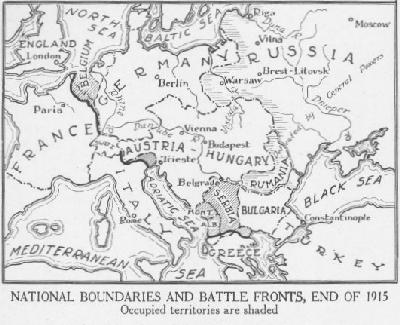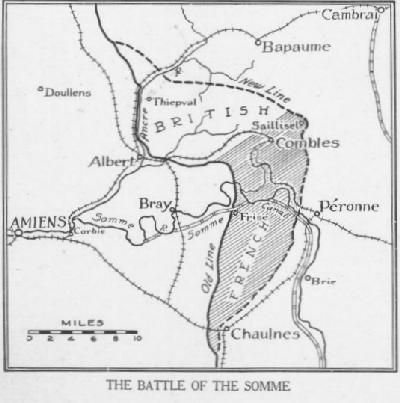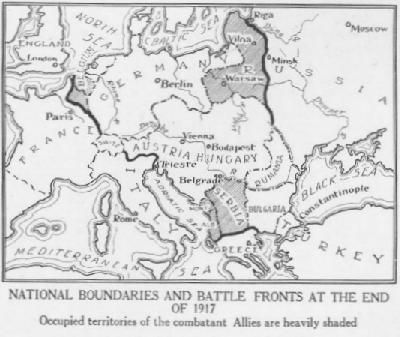
5. Italy joined the Allies in May and gave their cause new strength but the effect was more or less offset when Bulgaria entered on the side of the Central Powers.
The threatening situation on the Russian front and in the Balkans was still such that Germany was compelled to exert an immediate offensive effort in those directions and to maintain only a defensive attitude on the western front. German arms achieved a striking series of successes in the vicinity of the Mazurian Lakes and in Galicia, capturing Warsaw, Brest-Litovsk, and Vilna. The Central Powers over ran Serbia and Montenegro. Meanwhile, the Italian armies forced Austria to use approximately one-half of her strength against them. 
In the west, the French and British launched offensives which cost the German armies considerable loss; but the objectives were limited and the effect was local.
The Dardanelles expedition, having failed in its mission, was withdrawn in January, 1916. In Mesopotamia the Allied operations had not been successful. Although the British fleet had established its superiority on the sea, yet the German submarine blockade had developed into a serious menace to Allied shipping.
6. Germany no doubt believed that her advantage on the eastern  front at the close of 1913 again warranted an offensive in the west, and her attack against Verdun was accordingly launched in the spring of 1916. But Russia was not yet beaten and early in June, aided at the same time by the threat of an Italian offensive in the west, she began the great drive in Galicia that proved so disastrous to Austria.
front at the close of 1913 again warranted an offensive in the west, and her attack against Verdun was accordingly launched in the spring of 1916. But Russia was not yet beaten and early in June, aided at the same time by the threat of an Italian offensive in the west, she began the great drive in Galicia that proved so disastrous to Austria.
Rumania, having entered on the side of the Allies, undertook a promising offensive against Austria. The British and French Armies attacked along the Somme. Germany quickly returned to the defensive in the west, and in September initiated a campaign in the east which, before the close of 1916, proved unfortunate for Russia as well as Rumania.
7. Retaining on the eastern front the forces considered sufficient for the final conquest of Russia, Germany prepared to aid Austria in an offensive against Italy. Meanwhile, the Russian revolution was well under way and, by the midsummer of 1917, the final collapse of that government was almost certain.
The relatively low strength of the German forces on the western front led the Allies with much confidence to attempt a decision on this front; but the losses were very heavy and the effort signally failed. The failure caused a serious reaction especially on French morale, both in the army and throughout the country, and attempts to carry out extensive or combined operations were indefinitely suspended.
In the five months ending June 30, German submarines had accomplished the destruction of more than three and one-quarter million tons of Allied shipping. During three years Germany had seen practically all her offensives except Verdun crowned with success. Her battle lines were held on foreign soil and she had withstood every Allied attack since the Marne. The German general staff could now foresee the complete elimination of Russia, the possibility of defeating Italy before the end of the year and, finally, the campaign of 1918 against the French and British on the western front which might terminate the war. 
It can not be said that German hopes of final victory were extravagant, either as viewed at that time or as viewed in the light of history. Financial problems of the Allies were difficult, supplies were becoming exhausted and their armies had suffered tremendous losses. Discouragement existed not only among the civil population but throughout the armies as well. Such was the Allied morale that, although their superiority on the western front during the last half of l9l6 and during 1917 amounted to 2O per cent, only local attacks could be undertaken and their effect proved wholly insufficient against the German defense. Allied resources in man power at home were low and there was little prospect of materially increasing their armed strength, even in the face of the probability of having practically the whole military strength of the Central Powers against them in the spring of 1918.
Continue
Back
Table of Contents
Back to Legacy